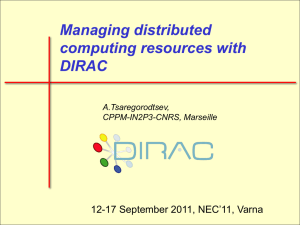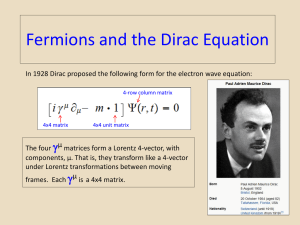Warschau
advertisement
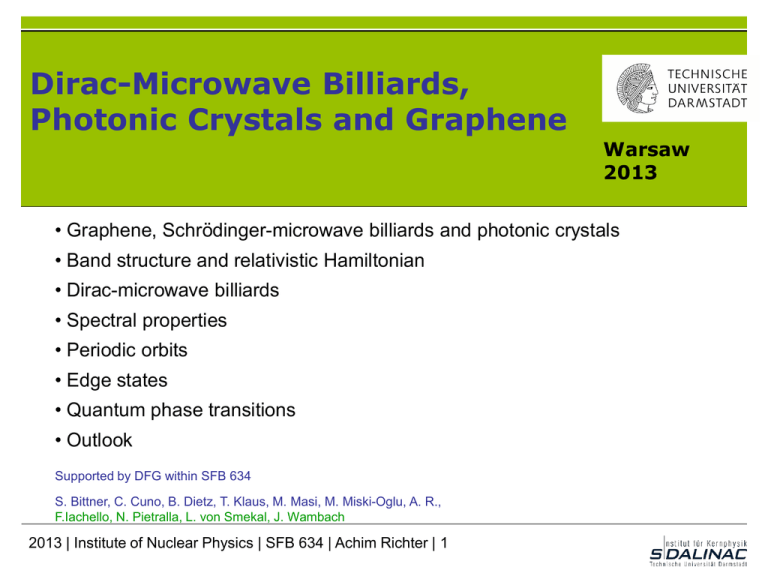
Dirac-Microwave Billiards, Photonic Crystals and Graphene Warsaw 2013 • Graphene, Schrödinger-microwave billiards and photonic crystals • Band structure and relativistic Hamiltonian • Dirac-microwave billiards • Spectral properties • Periodic orbits • Edge states • Quantum phase transitions • Outlook Supported by DFG within SFB 634 S. Bittner, C. Cuno, B. Dietz, T. Klaus, M. Masi, M. Miski-Oglu, A. R., F.Iachello, N. Pietralla, L. von Smekal, J. Wambach 2013 | Institute of Nuclear Physics | SFB 634 | Achim Richter | 1 Graphene • “What makes graphene so attractive for research is that the spectrum closely resembles the Dirac spectrum for massless fermions.” M. Katsnelson, Materials Today, 2007 conduction band • Two triangular sublattices of carbon atoms • Near each corner of the first hexagonal Brillouin zone the electron energy E has a conical dependence on the quasimomentum • but low • Experimental realization of graphene in analog experiments of microwave photonic crystals 2013 | Institute of Nuclear Physics | SFB 634 | Achim Richter | 2 valence band Closed Flat Microwave Billiards: Model Systems for Quantum Phenomena y vectorial Helmholtz equation cylindrical resonators z x 2f k E (r ) 0, n E (r ) G 0, k c c f f max E ( r ) E ( x, y )e z 2d 2 scalar 2 k E ( x, y) 0, E ( x, y) G 0 Helmholtz equation Schrödinger equation for quantum billiards 2013 | Institute of Nuclear Physics | SFB 634 | Achim Richter | 3 Open Flat Microwave Billiard: Photonic Crystal • A photonic crystal is a structure, whose electromagnetic properties vary periodically in space, e.g. an array of metallic cylinders → open microwave resonator • Flat “crystal” (resonator) → E-field is perpendicular to the plates (TM0 mode) • Propagating modes are solutions of the scalar Helmholtz equation → Schrödinger equation for a quantum multiple-scattering problem → Numerical solution yields the band structure 2013 | Institute of Nuclear Physics | SFB 634 | Achim Richter | 4 Calculated Photonic Band Structure • Dispersion relation of a photonic crystal exhibits a band structure analogous to the electronic band structure in a solid conduction band valence band • The triangular photonic crystal possesses a conical dispersion relation → Dirac spectrum with a Dirac point where bands touch each other 2013 | Institute of Nuclear Physics | SFB 634 | Achim Richter | 5 Effective Hamiltonian around Dirac Point • Close to Dirac point the effective Hamiltonian is a 2x2 matrix • Substitution and leads to the Dirac equation • Experimental observation of a Dirac spectrum in open photonic crystal S. Bittner et al., PRB 82, 014301 (2010) • Next: experimental realization of a relativistic billiard 2013 | Institute of Nuclear Physics | SFB 634 | Achim Richter | 6 Armchair edge Microwave Dirac Billiard: Photonic Crystal in a Box→ “Artificial Graphene“ Zigzag edge • Graphene flake: the electron cannot escape → Dirac billiard • Photonic crystal: electromagnetic waves can escape from it → microwave Dirac billiard: “Artificial Graphene“ • Relativistic massless spin-one half particles in a billiard (Berry and Mondragon,1987) 2013 | Institute of Nuclear Physics | SFB 634 | Achim Richter | 7 Microwave Dirac Billiards with and without Translational Symmetry billiard B1 billiard B2 • Boundaries of B1 do not violate the translational symmetry → cover the plane with perfect crystal lattice • Boundaries of B2 violate the translational symmetry → edge states along the zigzag boundary • Almost the same area for B1 and B2 2013 | Institute of Nuclear Physics | SFB 634 | Achim Richter | 8 Superconducting Dirac Billiard with Translational Symmetry • • • • • The Dirac billiard is milled out of a brass plate and lead plated 888 cylinders Height h = 3 mm fmax = 50 GHz for 2D system Lead coating is superconducting below 7.2 K high Q value Boundary does not violate the translational symmetry no edge states 2013 | Institute of Nuclear Physics | SFB 634 | Achim Richter | 9 Transmission Spectrum at 4 K • Measured S-matrix: |S21|2=P2 / P1 • Quality factors > 5∙105 • Altogether 5000 resonances observed • Pronounced stop bands and Dirac points 2013 | Institute of Nuclear Physics | SFB 634 | Achim Richter | 10 Density of States of the Measured Spectrum and the Band Structure stop band • Positions of stop bands are in agreement with calculation • DOS related to slope of a band Dirac point • Dips correspond to Dirac points • High DOS at van Hove singularities ESQPT? stop band Dirac point • Flat band has very high DOS • Qualitatively in good agreement with prediction for graphene (Castro Neto et al., RMP 81,109 (2009)) stop band • Oscilations around the mean density finite size effect 2013 | Institute of Nuclear Physics | SFB 634 | Achim Richter | 11 Tight-Binding Model (TBM) for Experimental Density of States (DOS) • Level density • Dirac point • Van Hove singularities of the bulk states • Next: TBM description of experimental DOS 2013 | Institute of Nuclear Physics | SFB 634 | Achim Richter | 12 Tight Binding Description of the Photonic Crystal • The voids in a photonic crystal form a honeycomb lattice t3 t2 t1 • resonance frequency of an “isolated“ void • nearest neighbour contribution t1 • next nearest neighbour contribution t2 • second-nearest neighbour contribution t3 • Here the overlap is neglected 2013 | Institute of Nuclear Physics | SFB 634 | Achim Richter | 13 Fit of the Tight-Binding Model to Experiment Experimental DOS Numerical solution of Helmholtz equation • Fit of the tight-binding model to the experimental frequencies , , yields the unknown coupling parameters f0,t1,t2,t3 2013 | Institute of Nuclear Physics | SFB 634 | Achim Richter | 14 Fit of the TBM to Experiment • obvious deviations • Fluctuation properties of spectra 2013 | Institute of Nuclear Physics | SFB 634 | Achim Richter | 15 good agreement Schrödinger and Dirac Dispersion Relation in the Photonic Crystal Dirac regime Schrödinger regime •Dispersion relation along irreducible Brillouin zone •Quadratic dispersion around the point Schrödinger regime •Linear dispersion around the point Dirac regime 2013 | Institute of Nuclear Physics | SFB 634 | Achim Richter | 16 Integrated Density of States Dirac regime Schrödinger regime • Schrödinger regime: with w the “effective mass“ discribing the parabolic dispersion , where m is • Dirac Regime: velocity at the Dirac frequency is the group with , where • Unfolding is necessary in order to obtain the length spectra 2013 | Institute of Nuclear Physics | SFB 634 | Achim Richter | 17 Integrated DOS near Dirac Point • Weyl’s law for Dirac billiard: (J. Wurm et al., PRB 84, 075468 (2011)) • • group velocity is a free parameter • Same area A for two branches, but different group velocities electron-hole asymmetry like in graphene (different opening angles of the upper and lower cone) 2013 | Institute of Nuclear Physics | SFB 634 | Achim Richter | 18 Spectral Properties of a Rectangular Dirac Billiard: Nearest Neighbour Spacing Distribution • • • • 159 levels around Dirac point Rescaled resonance frequencies such that Poisson statistics Similar behavior in the Schrödinger regime 2013 | Institute of Nuclear Physics | SFB 634 | Achim Richter | 19 Periodic Orbit Theory (POT) Gutzwiller‘s Trace Formula • Description of quantum spectra in terms of classical periodic orbits wave length spectrum spectral density spectrum numbers FT Peaks at the lengths l of PO’s Dirac billiard Periodic orbits Effective description around the Dirac point 2013 | Institute of Nuclear Physics | SFB 634 | Achim Richter | 20 Experimental Length Spectrum: Schrödinger regime • Very good agreement • Next: Dirac regime 2013 | Institute of Nuclear Physics | SFB 634 | Achim Richter | 21 Experimental Length Spectrum: Around the Dirac Point • Some peak positions deviate from the lengths of POs • Comparison with semiclassical predictions for a relativistic Dirac billiard (J. Wurm et al., PRB 84, 075468 (2011)) • Possible reasons for deviations: - Short sequence of levels (80 levels only) - Anisotropic dispersion relation around the Dirac point (trigonal warping, i.e. deformation of the Dirac cone) 2013 | Institute of Nuclear Physics | SFB 634 | Achim Richter | 22 Armchair edge Superconducting Dirac Billiard without Translational Symmetry Zigzag edge • Boundaries violate the translational symmetry edge states • Additional antennas close to the boundary 2013 | Institute of Nuclear Physics | SFB 634 | Achim Richter | 23 Transmission Spectra of B1 and B2 around the Dirac Frequency • Accumulation of resonances above the Dirac frequency • Resonance amplitude is proportional to the product of field strengths at the position of the antennas detection of localized states 2013 | Institute of Nuclear Physics | SFB 634 | Achim Richter | 24 Comparison of Spectra Measured with Different Antenna Combinations Antenna positions • Modes living in the inner part (black lines) • Modes localized at the edge (red lines) have higher amplitudes 2013 | Institute of Nuclear Physics | SFB 634 | Achim Richter | 25 TB prediction Smoothed Experimental Density of States • Clear evidence of the edge states • Position of the peak for the edge states deviates from the theoretical prediction (K. Sasaki, S. Murakami, R. Saito (2006)) • Modification of tight-binding model including the overlap is needed 2013 | Institute of Nuclear Physics | SFB 634 | Achim Richter | 26 Summary I • Measured the DOS in a superconducting Dirac billiard with high resolution • Observation of two Dirac points and associated van Hove singularities: qualitative agreement with the band structure for graphene • Description of the experimental DOS with a Tight-Binding Model yields perfect agreement • Fluctuation properties of the spectrum agree with Poisson statistics • Evaluated the length spectra of periodic orbits around and away from the Dirac point and made a comparison with semiclassical predictions • Edge states are detected in the spectra • Outlook: Do we see quantum phase transitions? 2013 | Institute of Nuclear Physics | SFB 634 | Achim Richter | 27 Spectroscopic Features of the DOS in a Dirac Billiard • Experimental density of states in the Dirac billiard saddle point saddle point • Features of the DOS related to the topology of the isofrequency lines in k-space • Van Hove singularities at saddle point: density of states diverges logarithmically for quasimomenta near the M point • Topological phase transition 2013 | Institute of Nuclear Physics | SFB 634 | Achim Richter | 28 Why is this a Topological Phase Transition? • Consider real graphene with tunable Fermi energies, i.e. variable chemical potential → topology of the Fermi surface changes with phase transition in two dimensions • Disruption of the “neck“ of the Fermi surface • This is called a Lifshitz topological phase transition with as a control parameter (Lifshitz 1960) • What happens when is close to the Van Hove singularity? 2013 | Institute of Nuclear Physics | SFB 634 | Achim Richter | 29 Finite-Size Scaling of DOS at the Van Hove Singularities • TBM for infinitely large crystal yields • Logarithmic behaviour as seen in - transverse vibration of a hexagonal lattice (Hobson and Nierenberg, 1952) - vibrations of molecules (Pèrez-Bernal, Iachello, 2008) - two-level fermionic and bosonic pairing models (Caprio, Scrabacz, Iachello, 2011) • Finite size photonic crystals or graphene flakes formed by , i.e. logarithmic scaling of the VH peak determined using Dirac billiards of varying size: 2013 | Institute of Nuclear Physics | SFB 634 | Achim Richter | 30 hexagons DOS, Static Susceptibility and Particle-Hole Excitations: Lindhard Function • Polarization of the medium by a photon → bubble diagram • Summation over all momenta → Lindhard function • Static susceptibility of virtual electron-hole pairs defined as • It can be shown within the tight-binding approximation that , i.e. evolves as function of the chemical potential like the DOS → logarithmic divergence at • Divergence of at (Van Hove singularity) caused by the infinite degeneracy of ground state: ground state QPT 2013 | Institute of Nuclear Physics | SFB 634 | Achim Richter | 31 Spectral Distribution of Particle-Hole Excitations • Spectral distribution of the particle-hole excitations Schrödinger regime Dirac regime • Same logarithmic behavior as for the ground-state observed for the excited states: ESQPT • Logarithmic singularity separates the relativistic excitations from the nonrelativistic ones 2013 | Institute of Nuclear Physics | SFB 634 | Achim Richter | 32 Outlook 200 mm • ”Artificial” Fullerene • Superconducting quantum graphs • Test of quantum chaotic scattering predictions (Pluhař + Weidenmüller 2013) 2013 | Institute of Nuclear Physics | SFB 634 | Achim Richter | 33 50 mm • Understanding of the measured spectrum in terms of TBM
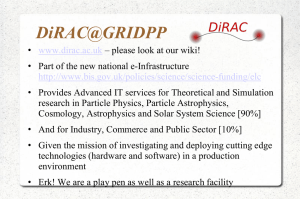


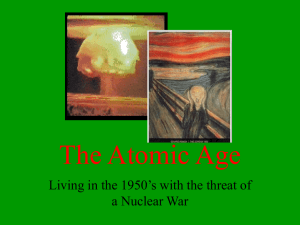

![The Politics of Protest [week 3]](http://s2.studylib.net/store/data/005229111_1-9491ac8e8d24cc184a2c9020ba192c97-300x300.png)
